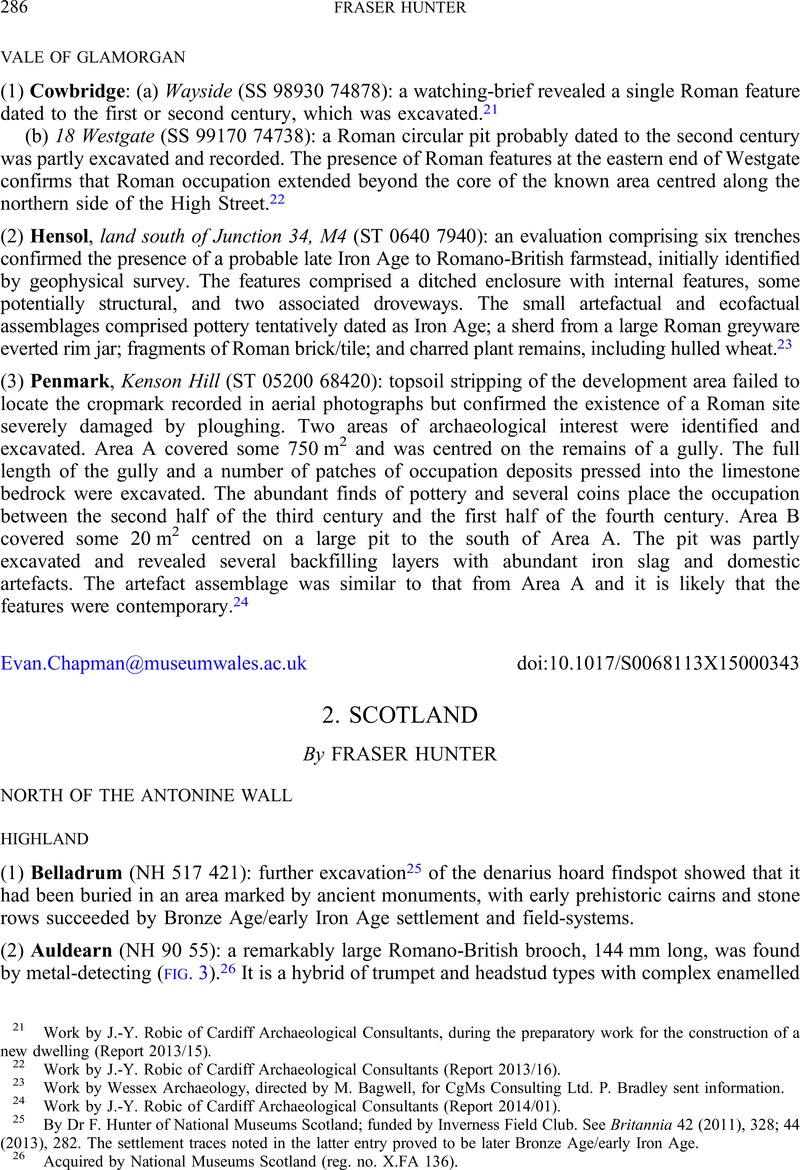Published online by Cambridge University Press: 16 September 2015

25 By Dr F. Hunter of National Museums Scotland; funded by Inverness Field Club. See Britannia 42 (2011), 328Google Scholar; 44 (2013), 282. The settlement traces noted in the latter entry proved to be later Bronze Age/early Iron Age.
26 Acquired by National Museums Scotland (reg. no. X.FA 136).
27 Other stray discoveries unassociated with known sites in 2014 comprise brooches from Broomhill and Charlestown (both Fife), Ospisdale (Highland), Kinnaird and Easter Balgedie (Perth and Kinross) and Libberton (South Lanarkshire). Brooches were also found on or near the Roman military sites of Inchtuthil (Perth and Kinross) and Carriden (Falkirk), while a stone mortar was found in a drystone wall near Rough Castle (Falkirk). For details see Discovery and Excavation in Scotland 15 (2014), 83–4Google Scholar, 87, 101, 159, 169–70, 184.
28 For Professional Propertay Ltd by C. Fyles and R. Cachart of Alder Archaeology; D. Bowler sent a report. For the site, see Jones, –R.H., Roman Camps in Scotland (2011), 266–7Google Scholar; Britannia 45 (2014), 314–15Google Scholar.
29 Excavations were directed for Glasgow University's SERF Project by J.A. Durnan; Dr T. Poller sent a report.
30 For the site, see Jones, R.H., Roman Camps in Scotland (2011), 191–2Google Scholar.
31 The U-shaped recut was 2 m wide and 0.75 m deep.
32 Led by Dr E. Campbell as part of Glasgow University's SERF project; Dr T. Poller sent a report.
33 Confirming earlier evidence of a ditch recut at the north-western and western entrance; Dunwell, A. and Keppie, L., Britannia 26 (1995), 51–62CrossRefGoogle Scholar.
34 Led for Bracewell Stirling Consulting by C. Rennie and M. Kilpatrick of GUARD Archaeology; B. Will sent a report.
35 Similar ditches had been located in an adjacent development; Britannia 43 (2012), 285Google Scholar.
36 For A-Cubed Design by C. Rennie of GUARD Archaeology; B. Will sent a report.
37 For Mr Beattie by G. Bailey of Falkirk Museum.
38 Led by G. Bailey (who sent a report) for Falkirk Local History Society and Edinburgh Archaeological Field Society.
39 For the fort, see Robertson, A. and Keppie, L., The Antonine Wall: a Handbook to the Surviving Remains (2001), 64–5Google Scholar.
40 To Dr A. Bicket of Wessex Archaeology, who sent information and discussed the results. See Discovery and Excavation in Scotland 2014, 142–3.
41 Discovery and Excavation in Scotland 2014, 176–7. The only other Roman finds recorded in association with Iron Age sites in 2014 were a plate brooch and denarius of Domitian from near Torwoodlee broch (Scottish Borders); see Discovery and Excavation in Scotland 2014, 172.
42 For Fountains Forestry by R. Cachart and C. Fyles of Alder Archaeology; D. Bowler sent reports.
43 For Fountains Forestry by R. Cachart of Alder Archaeology; D. Bowler sent a report.
44 For Iberdrola Engineering and Construction by S. Mitchell, G. Carruthers and R. Hunt of CFA Archaeology; A. Dunwell sent a report.
45 Jones, R.H., Roman Camps in Scotland (2011), 143–4Google Scholar.
46 It lay about 5 m north of the position from rectified aerial photos.
47 Ovens are known from previous work in the camp; Jones, R.H., Roman Camps in Scotland (2011), 144Google Scholar.
48 Claimed as Treasure Trove and allocated to Dumfries Museum.